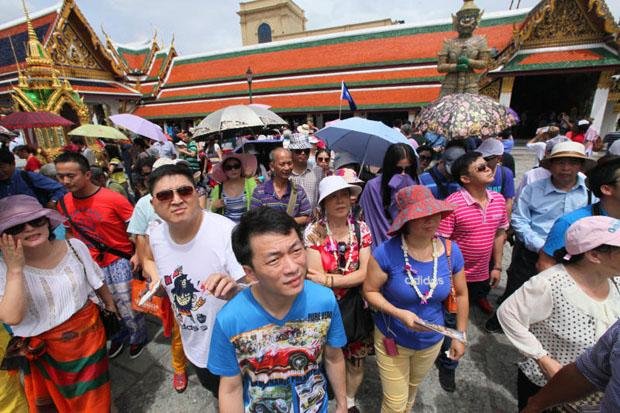
Amid concerns that the impact of the Aug 17 Erawan Shrine bombing will not fade away easily, the largest Chinese tourist group ever for Thailand has decided to revisit the country.
The Tourism Authority of Thailand (TAT) has secured a deal with large direct sales company Infinitus (China), which has rewarded 20,000 employees with another trip to Thailand next year, says TAT governor Yuthasak Supasorn.
In May, Infinitus also rewarded 12,700 staff who travelled in groups of 2,000 to 3,000 each for a six-night package that took in Bangkok and Pattaya, with all of them staying in four- and five-star hotels and occupying a total of 38,000 rooms.
They used a total of 110 regular flights to transport the delegates, while 400 coach trips and 36 river cruise tours were reserved for the groups.
Next year Infinitus will award a revisit package tour to Bangkok and Pattaya, earmarking 1 billion baht in total spending for the trip.
Their spending is a lot of money, but the revisit of Infinitus employees means a lot more than that, as the deal was secured shortly after the massive blast at Bangkok's Erawan Shrine that killed 20.
Furthermore, investigators have uncovered a link to the Uighurs, an ethnic minority in northwestern China.
The blast hit Thailand's image severely, as more than 20 nations and territories promptly issued travel advisories for their citizens about travelling to Thailand.
Hotels and tour operators experienced cancellations, especially by Chinese tour groups.
A total loss of 64 million baht was incurred by the blast, while the average occupancy rate of Bangkok's hotels fell by 10% year-on-year to a rate of 55%.
The average occupancy rate in Bangkok is estimated at 50-55% this month, down from 60-65% last September, says Surapong Techaruvichit, president of the Thai Hotels Association (THA), adding that other resort destinations are still expected to outperform year-on-year.
However, only a few weeks after the blast, Chinese tourists have started returning, and last week there were no further cancellations of tour groups, according to the Association of Thai Travel Agents (ATTA) and the THA.
The operators predict the tourism industry will be back to normal next month.
Mr Yuthasak says the reason is very simple: "They like Thailand. We share a common culture and some customs and habits that make them feel more comfortable staying here than in other places such as food and leisure activities. And we're a shopping paradise for them."
Thailand still boasts cheaper daily living costs and shopping compared with other countries offering a similar standard of services and facilities, he says.
At the same time, the plethora of megamalls are a major magnet persuading Chinese to revisit.
However, Mr Yuthasak says it is crucial for the TAT not to underestimate the unexpected despite Thai tourism having rebounded from the 2003 Sars epidemic, the 2004 tsunami, the 2009 global economic crisis and the 2011 flooding.
He says the TAT has planned a series of events aimed at restoring tourists' confidence in travelling to Thailand, kicking off with a visit by Hong Kong superstars Michelle Yim and Simon Yam, who will make merit at the Erawan Shrine today.
"If the stars' visit garners a good response from tourists, we'll launch another scheme in December to maintain the momentum through next year," says Mr Yuthasak.
Declining to give details, he says: "I don't want to see any price war in the business, and the operators agree with that."
The TAT must also focus on domestic tourism to serve government policy at a time of global economic uncertainty.
"We have to rely on ourselves rather than on outsiders," says Mr Yuthasak.
ATTA president Charoen Wangananont expects Chinese tourist arrivals during China's 10-day Golden Week from Oct 1 will surpass 200,000.
No one can break down the economic losses from the blast, but the number of Chinese arrivals is not a concern, he says.
Chinese accounted for 27.5% of the 20 million tourist arrivals in the first eight months of this year.
A total of 5.5 million Chinese visited Thailand during that period, a 70% rise year-on-year, with more than 7 million Chinese visitors expected for the full year.
Revenue in the eight-month period rose by 31% year-on-year to 952 billion baht.



